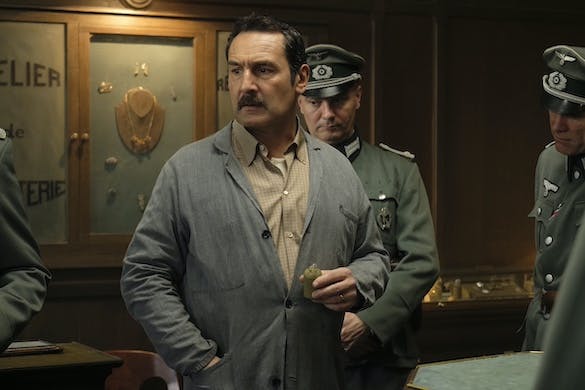‘Farewell, Mr. Haffmann’: World War II Drama Implicates Its Characters in Uneasy Morality
A thriller, the film grapples with the nature of right and wrong during wartime, with uncomfortable decisions made by all of the small cast of characters.

Collaboration during the Nazi occupation of Paris takes center stage in a new Gallic drama, “Farewell, Mr. Haffmann,” playing at the Quad Cinema starting Friday. A disabled French gentile, François, works as a jeweler’s assistant to Joseph Haffmann, a Polish-French Jew who early on in the film transfers the deed of his shop to this associate with the intention of getting it back once the war ends. In doing so, Haffmann unwittingly unleashes craven, avaricious, aggressive characteristics in François, leading the character not only to buddy up to German officers but become a stranger to his wife.
A morally sharp thriller, the film grapples with the nature of right and wrong during wartime, with uncomfortable decisions made by all of the small cast of characters. The film’s focused narrative and predominantly singular setting may betray its theatrical roots — it is based on a play — yet director Fred Cavayé uses the medium’s closeups and natural fluidity to perceptively explore how a decent man can compromise himself and lose everything in the process.
The eponymous Haffmann starts the movie as a successful jeweler, but he moves quickly to protect his family and livelihood as soon as he sees an ominous sign, posted in May 1941, of an upcoming Jewish census. To this end, he hires someone to smuggle his wife and three children to the non-occupied zone, or zone libre, vowing to join them soon. He then proceeds to hand over his business to his fairly new assistant, with François agreeing to give the shop back upon his return.
François’s wife Blanche is skeptical of the arrangement, yet acquiesces when faced with her husband’s enthusiasm for living in the bourgeois Haffmann apartment just above the shop. Their marriage, while loving, is childless because François is sterile, resulting in Blanche placating her husband’s fragile ego whenever she can.
Once the transaction is done, Haffmann’s attempt to meet up with his family fails and, with nowhere else to go, he returns to the shop. François hides Haffmann in the basement workshop, the space formerly relegated to him as assistant. The movie then jolts the viewer with a doozy of a twist, one I hesitate to disclose even if prefaced with a spoiler alert disclaimer.
As Haffmann, venerable French actor Daniel Auteuil brings his trademark gravity to a dignified character living through extenuating circumstances. A saucer-eyed gaze from the actor says just as much, if not more, as some of the script’s overly pointed lines of dialogue do. Indeed, voiceless looks and uncertain silences haunt the movie, enveloping it in a tense atmosphere. Actress Sara Giraudeau as Blanche makes the most of these moments. The character doesn’t say a whole lot, or assert herself much until the movie’s end, but Ms. Giraudeau doesn’t need speech to convey what Blanche is feeling.
The chemistry between Ms. Giraudeau and Gilles Lellouche as François may leave viewers wanting more than what is on-screen, which essentially boils down to him being overbearing and old-fashioned and she mousy and subservient. It could even be said that Mr. Lellouche has a closer connection to a German commandant played by Nikolai Kinski than Ms. Giraudeau.
Yet this lack of a strong emotional bond between the couple lines up with their eventual unraveling, with a conjugal scene in the film’s third act particularly disturbing. For his part, Mr. Lellouche, with his vigorous mustache, mostly plays François’s decline into a morass of collaboration, jealousy, and feelings of inadequacy with precision and subtlety.
The Faustian trade-off at the heart of the story — François gains material wealth and a modicum of respectability at the cost of his soul — leads to further slippery slopes when his German officer friend hands over jewelry taken from transported Jews for him to re-fashion. And when the narrative arrives at 1942, and the predominantly Jewish neighborhood in which the shop and apartment reside becomes a ghost town, the emptiness of the locale matches the hollowness of François’s efforts.
If only the film’s climax and denouement made more logical sense, for then “Farewell, Mr. Haffmann” would have made even more of an impact. As it stands, though, the modest movie presents a complex portrait of complicity and shifting moral standards that raises the question: How would you behave during desperate, dangerous times?

